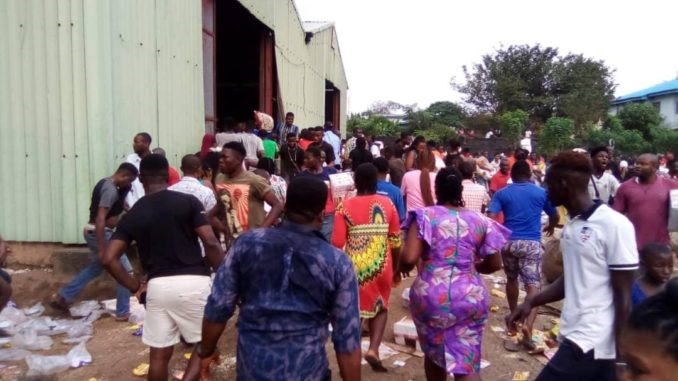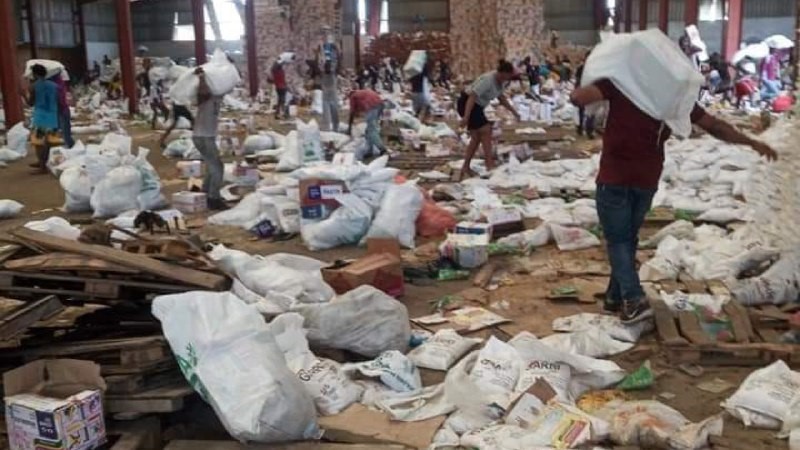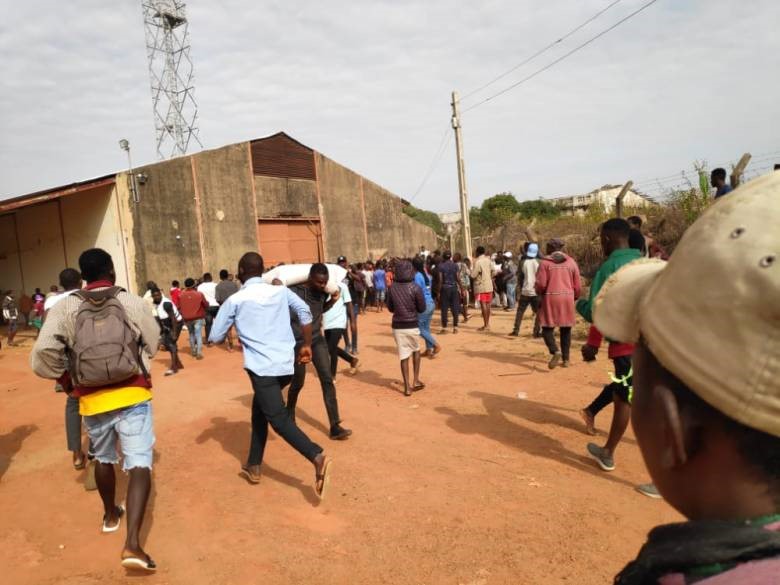Nigerians Blame Looting Of COVID-19 Warehouses On Wickedness Of Leaders

Since the hijack of the peaceful #EndSARS protest by hoodlums after the shooting of unarmed youth at Lekki Tollgate on October 20, warehouses suspected to hold COVID-19 palliatives have been under attack across Nigeria.
The attackers have not spared private warehouses either once the structure is suspected to hold food stocks meant to ameliorate the pains of the people from the COVID-19 pandemic.
Other public infrastructure, including court buildings, monuments, buses and police stations, have also been destroyed as a show of anger and frustration against the government.
Also, individuals suspected to be members of the political elite had their assets or those suspected to belong to them vandalised.
Similarly, individuals and businesses such as banks, supermarkets, pharmacies, small retail stores, among others, without political interests, have been attacked and destroyed.
During the attacks, some deaths have been recorded either as a result of stampede or from bullets of armed security personnel manning the facilities.
But apart from looting food stores, the looters have pillaged anything on their way, including expired and dangerous drugs, hospital equipment, farm implements and signboards.
Meanwhile, the discovery of warehouses where food and other COVID-19 relief items donated by individuals and organisations for distribution to needy Nigerians has elicited criticism among the populace who describe the holding back of the stocks as wickedness among leaders.
Four months after the easing of the COVID-19 lockdown, most of the palliative items remained in government warehouses while the people complained.
Critics allege ulterior motives, including commercial and political interests by officials who kept the items while the people suffered.
For example in Lagos State, Southwest Nigeria, a warehouse in Monkey Village, Maza Maza, was invaded and video evidence showed people from different classes of the society carrying away food items.
Some youths broke into the warehouse and asked people in the neighbourhood to move in and take what they needed.
The looting lasted almost a whole day and some people returned to take second rations but there was neither struggle nor fight among these Nigerians united by hunger.
Reports said that the hoodlums made a bonfire at a junction near the warehouse and asked residents to move stocks to their homes.
The Lagos State Government admitted that the food items were COVID-19 palliatives delivered on September 22 and that they were still under distribution.
In a release, Abisola Olusanya, the acting Commissioner for Agriculture in Lagos State, said the warehouse held palliative packages donated to the state government by the Private Sector Coalition against COVID-19 (CACOVID) group.
“The government notes that the warehouse in question is not state-owned and its usage was made available to the CACOVID group.
“The state government had been allowed to commence rebagging of food items allotted to it from the quantities meant for Southwest states.
“The re-bagging was being done to account for each beneficiary receipt, as was required and monitored by the CACOVID team, the distribution was ongoing but had to be halted due to protests, before the invasion of the warehouse yesterday, ” Olusanya said.
In Osun State, Southeast Nigeria, a warehouse containing items, including beans, noodles, sugar, salt, garri, rice, pasta, vegetable oil, among others was broken into and looted from in the moribund Cocoa Industry, Ede.
Osun Food and Relief Committee on COVID-19 claimed the items were not hoarded but being kept for the formal launch of the distribution under the supervision of Food and Relief Committee.
Alhaji Bayo Jimoh, the Secretary to the committee, in a release said that the items were donated to the committee as palliatives to the people by Private Sector Coalition Against COVID-19 and could only be distributed after a formal flag-off by the CACOVID Office, Abuja.
“We do not have the authority to distribute the food items without approval from Abuja,” he stated.
In Anambra State, Southeast Nigeria, a COVID-19 warehouse was invaded by looters, who could not gain access because of the presence of soldiers and policemen guarding the facility.
The government hurriedly moved in trucks to evacuate the items following the invasion on Saturday, October 24, while some youths loitered around the warehouse angrily to take a share of the items.
One of the trucks moving the items was accosted along the road and items inscribed COVID-19 palliative were looted in the presence of security personnel, who watched helplessly.
Mr C-Don Adinuba, the Commissioner for Information and Public Enlightenment in Anambra, claimed the items in the warehouse were foodstuff meant for flood victims in coastal communities who were in camps.
“The Anambra State Government would like to inform the public that four out of the six truckloads of foodstuffs meant for four local government areas in Anambra State submerged by flood which were attacked and vandalised by miscreants today in Awka have reached their destinations.
“This is contrary to the claims in some quarters that all six truckloads were successfully hijacked by hoodlums who considered them palliatives for Anambra people to cushion the economic and nutritional effects of the coronavirus pandemic.
“The foodstuffs which left our warehouse today are the garri and noodles which were purchased about four days ago, though there are some which are leftovers from COVID-19 donations,” the commissioner said in a release.
Some persons in Anambra are asking why the evaluation of supplies for flood victims coincided with the day angry youths tried to loot the warehouse when the flood victims have been in camps for over three weeks without help.
A man was feared dead in Edo State, South-South Nigeria, when the COVID-19 palliative warehouse in Benin city, the capital, was looted on Saturday, October 24.
Reports said the mob which was prevented by military personnel from looting the warehouse earlier in the day succeeded in breaking the security cordon and entered the store in hundreds.
The state government through Crusoe Osagie, Special Adviser to Governor Godwin Obaseki on Media and Communication Strategy, said the distribution had been an ongoing process as they were received in the past seven months.
In Plateau State, North Central Nigeria, the government reinstated a curfew following a raid of a COVID-19 palliative warehouse in Bukuru area of Jos, the capital city on Saturday.
Also in Cross River State, South-South Nigeria, hoodlums on Friday, October 23, looted the COVID-19 palliative warehouse at Bishop Moinagh Street, Calabar.
A similar act occurred in Kwara, Taraba, Kaduna, Sokoto, Kogi states, among others.
with attendant loss of lives and injuries.Prof. Hassan Oaikhenan of the Department of Economics and Statistics, University of Benin, said the excuses offered by most state governments were untenable under the circumstances.
Oaikhenan said that almost all the states in the federation were complicit in the act and described it as wickedness on the part of the ruling class.
He said it was a throwback of the slave era when people sold their brothers so they could possess the property alone.
He said it could not be explained that items donated as succour for the poor who were trapped in the painful effect of COVID-19 economic crunch and lockdown were locked up in warehouses up till now that people were no longer thinking about them.
“Their excuses are neither here nor there, they are just trying to lock the stable when the horse had bolted, it is a show of how much they love the masses they were elected to cater to.
“It could be for commercial purposes they will re-bag and sell or political purposes where they will give them to party loyalists for political advantage but in summary, it demonstrates wickedness of the extreme,” Oaikhenan said.
He said the #EndSARS protesters should have made broader demands other than the end of police brutality but that it had provided an opportunity for the masses to know their leaders by exposing some of their deeds.
Mr Osita Obi, the Convener of Recover Nigeria Project, said he was not surprised by the revelations because governors under whose watch those items were kept in warehouses were members of the Nigerian society which was still enmeshed in endemic corruption.
Obi, a human rights activist, said he suspected that the items were preserved for political reasons and meant to court the loyalty of members of the public.
He said although people were aware that these things existed they never had time to strike.
“In some places, when the issue came up, the government tried to move the items to another location.
“Remember when the minister for Humanitarian Affairs said every family got something as palliative, people doubted but now we have seen where they are stored for reasons we don’t know.
“Our leaders have always lived off the masses, it is symptomatic of the corruption in our system; look at the 774,000 jobs meant for the poor, the senators wanted to corner them so they can share according to their wish,” he said.
Also, Rev. Martins Onwudiwe, Director of Communications, Catholic Diocese of Nnewi, said it was disappointing that palliatives were stored in large quantities in warehouses while the people were hungry.
Onwudiwe said the #EndSARS protest had become a blessing which would change Nigeria.
“When we say that a hungry man is an angry man, it comes to play here. #EndSARS protest is a blessing to Nigeria and after all these, Nigeria will never remain the same again,” he said.
Support Our Journalism
There are millions of ordinary people affected by conflict in Africa whose stories are missing in the mainstream media. HumAngle is determined to tell those challenging and under-reported stories, hoping that the people impacted by these conflicts will find the safety and security they deserve.
To ensure that we continue to provide public service coverage, we have a small favour to ask you. We want you to be part of our journalistic endeavour by contributing a token to us.
Your donation will further promote a robust, free, and independent media.
Donate HereStay Closer To The Stories That Matter






